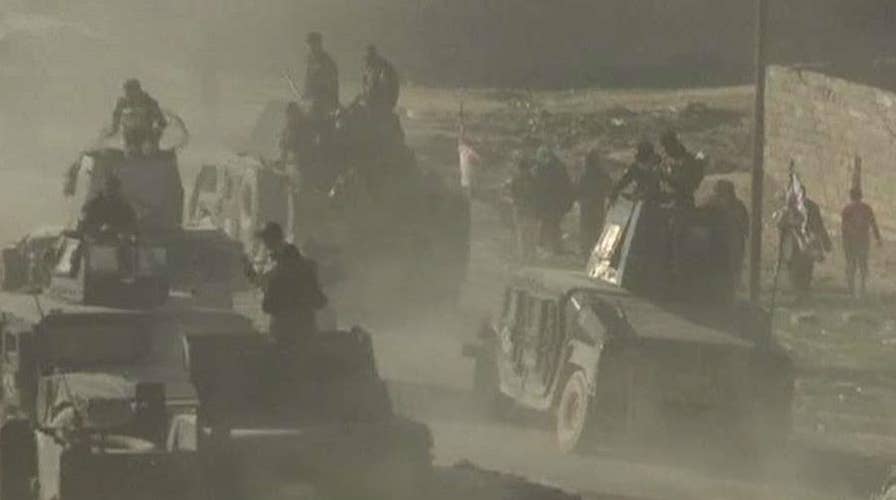ERBIL, Iraq – The death toll and injuries incurred by the Kurdish Peshmerga are mounting in the battle against ISIS, but despite the rising number of fallen and maimed fighters, officials say it would be worse without U.S. training.
The number of dead stands at an estimated 1,600, and thousands more have lost limbs or been burned by chemical weapons. Yet, they say training has spared many more.
“In the early days, we would have 70 wounded soldiers coming in all at once from one battle, only a few nurses and doctors who would work three shifts without break,” Pshtiwan Aziz, manager of the Emergency Management Center in Erbil, told FoxNews.com. “But now they have had American training, many less are coming in with wounds. Just a few, even from big battles.”
From tourniquet techniques and proper bandaging to how to position the wounded for transport, training for thousands lasted several weeks. Each training block was tailored to the needs of a specific unit, with especially focused instruction on how to handle casualties from improvised explosive devices. IEDs have caused as much as 85 percent of casualties, and coalition personnel worked extensively in the lead-up to the campaign to retake Mosul on strategies to mitigate their damage.
Given that Kurds lack medical-evacuation helicopters and well-equipped mobile hospitals, on-the-field triage is critical. Yet, even for those who are saved, the army’s poor funding remains an obstacle. Nearly 9,500 Peshmerga fighters have been wounded in the last 2 ½ years, many of them seriously.
The brutal war has ravaged the economy of the semi-autonomous region to such a degree that some Kurds refer to the mounting debt as a “worse threat than ISIS.”
Thousands of wounded soldiers are consequently being treated in public hospitals across the region, many miles from the frontlines, where they have to compete with other ordinary casualties in what is already a greatly over-burdened health care system. A few of what doctors describe as the “fortunate” ones have been sent abroad for surgeries to places like India, Turkey, Jordan and Germany for better medical assistance.
Inside the EMC, a crumpled collection of chipping white walls in the center of Erbil, the frustration is evident. There are thousands of case files on the wounded, and scores of soldiers -- young and old, body parts gone -- file in and out looking for treatment and answers.
Phwan Ishmael, 31, an engineering student, was defusing a roadside bomb for the Peshmerga in December 2014, when it exploded. His comrades died, and much of his body was burned. But the worst part, he told FoxNews.com, was losing his hearing.
Karwan Saeed, 37, was one of the first victims of an ISIS chemical attack. Just outside of Mosul in July last year, Saeed went to inspect a Katysha rocket that hit a few yards in front – not knowing of its chemical payload. Now his body and eyes well endlessly and his skin erupts into excruciating rashes. In a recent interview, he pulled out a bar of oatmeal soap, and declared the treatment ineffective.
Khider Merkir, 42, a 25-year Peshmerga serviceman, was ambushed by ISIS fighters nearly a year ago while patrolling in the Makhmour area. A round from a BKC -- also known as PKM machine gun -- cleaved right below his left ear and lodged just a few millimeters from the top disc in his back -- where it remains, infected and inflamed.
“I want to remove the bullet,” Merkir said. “But it is a sensitive operation, and they can’t do it here.”
Then there is Bazhar Hussein, 32, who was working on the frontlines for the region’s leading security and intelligence branch – the Asayish – when the crucial first and second vertebrae in his back were struck by a sniper’s bullet. Hussein can no longer control his legs, head or eyes. Sometimes, he can slowly speak, but other times his eyes swell with confused tears as the words simply won’t come.
“He wasn’t like this before; he used to be able to talk. But now it is getting worse and worse,” one nurse said softly, helping him reach for the walker. “But that’s what this war has done to people.”
But the person who has waited the longest for treatment is that of Nabil Majeed, 36, who became the very first Peshmerga fighter to be injured during the war in early July 2014. He was inside a Christian village near Mosul when he opened fire on an ISIS operative putting up propaganda posters in the street. Majeed’s body was battered by bullets in the exchange and since that day he has had nine teeth and part of his tongue removed and can no longer close his left eye or chew. His nerves are riddled with damage and two of his ribs have been removed and instead inserted into his face where his jaw once was in a complicated bone graft operation.
Yet for him there is no self-pity, no anger.
“I miss going outside in the sun. Now the sun makes my eye swell, and I always feel like something is in front of my eye,” he says. “Something is always in front of me. And I don't know what it is."

